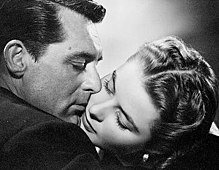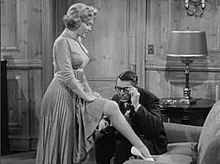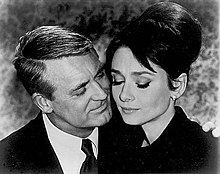Cary Grant
Jump to navigation
Jump to search


Cary Grant (18 January 1904 – 29 November 1986), born Archibald Alexander Leach, was an English - American stage and Hollywood film actor who became an American citizen in 1942. Performing with a Mid-Atlantic accent, he is remembered as a debonair and handsome leading man capable of being witty and charming. He was named the second Greatest Male Star in the AFI's 100 Years...100 Stars list by the American Film Institute.
Quotes[edit]



- I suppose you might call me the sophisticated type. I like to act with dialogue. Not with grunts.
- I really am a happy, amusing fellow at heart. Trouble is I seem the only one left.
- As quoted in "Cary Grant is puzzled because you have No Time for Laughs" by Robert Ottaway in Picturegoer magazine (4 January 1958)
- Everybody wants to be Cary Grant. Even I want to be Cary Grant. I have spent the greater part of my life fluctuating between Archie Leach and Cary Grant; unsure of either, suspecting each. I pretended to be somebody I wanted to be until finally I became that person. Or he became me.
- Quoted in "Cary Grant: A Biography" by Marc Eliot
- I often think my life has been a failure. But whenever I drop into a theater and hear women laugh at one of my films, I think, well, if I brightened their day before they went home and did the dishes, maybe my life wasn't wasted, after all.
- As quoted in "They Changed Their Careers and Became Famous; Cary a Failure?" by Jack Harrison Pollack, Parade (November 16, 1969), p. 7; and The Filmgoer's Book of Quotes (1978) by Leslie Halliwell, p.229
- I do! I don't remember ever saying it in a movie, but now, every once in a while when I'm with friends, I say, "Judeeee, Judeeee, Judeeee," and everyone breaks up. Isn't that a good imitation of an imitation of an imitator?
- In response to interviewer Hy Gardner's query as to which impressionist did the best version of that signature catch-phrase; in "Q & A on Cary Grant", Variety (January 7, 1970), p. 45
- My formula for living is quite simple. I get up in the morning and I go to bed at night. In between times, I occupy myself as best I can.
- 1978 interview with Roderick Mann, "Cary Grant: Doing What Comes naturally," The Los Angeles Times (June 11, 1978), p. 39; as quoted in "Quotable Cary" at American Masters (25 May 2005)
- On The Awful Truth we just clicked. She'd been a weepie star and comedy was strange to her. She'd do a bit and whisper to me, "Funny?" She was the sweetest smelling of my leading ladies and such a lady. If one of the crew cussed, she'd blush. She claims she was out shopping at Bullocks for a present for her husband and the saleslady said, "I don't think Mr. Grant would like that." In the minds of the public, we were married. Reunions became impossible because we both liked first billing. It's ladies first in rowboats but not in movies, I'm afraid. But I still see her at the races and she still smells wonderful, although it's not Fabergé.
- On Irene Dunne, in a 1980 interview/profile by James Bawden in The Hamilton Spectator; as quoted in Conversations with Classic Film Stars (2016) by Bawden and Ron Miller, p. 123
- Comment: The Fabergé reference appears to be Grant's winking acknowledgment of the fact that the interview had only come about because the actor, who had been elected to that company's board of directors roughly 12 years earlier, was in town solely to open/promote their new Toronto plant.
- On Irene Dunne, in a 1980 interview/profile by James Bawden in The Hamilton Spectator; as quoted in Conversations with Classic Film Stars (2016) by Bawden and Ron Miller, p. 123
- The film I most cared about was a flop. None But the Lonely Heart was the only time I played a character very near myself, a man unsure of himself, a drifter, a rake.
- Evidently from the same 1980 James Bawden interview; as quoted in "Cary Grant's Star Never Lost its Glow" by Bawden, Toronto Star (December 1, 1986), p. D1
Love – That’s All Cary Grant Ever Thinks About (1964)[edit]
- Quotes of Grant from "Love – That’s All Cary Grant Ever Thinks About" by Sheilah Graham Westbrook in Motion Picture (June 1964)
- I’m prepared. I have a gun and I know how to shoot, and whoever comes calling without an invitation will get it in the rear end.
- Do not blame others for your own mistakes. … YOU are Mother Nature. You have the power within you to be thin or fat, as you desire. … God is within you, and you can do and have anything you want. You must love yourself more. … and then … you can love your fellow man.
- Don’t go to extremes. Don’t hate too much and don’t love too much. Try to live somewhere in the middle. Hate destroys the hater. And if you love too much you get too involved and you cannot see too clearly. Love and hate are like night and day. They do exist together and you must accept them both, but you must also understand them and be in control of both emotions. It is peaceful in the middle. You won’t be hurt in the middle.
- It is the law of life that if you are kind to someone you feel happy. If you are cruel you are unhappy. And if you hurt someone, you will be hurt back.
- Anyone can do well … It’s all out there waiting for you to take. But first you must reach out and get it. You must work for your riches. You cannot expect it to fall into your lap.
- You must learn to live within yourself … You must establish the values by which you live. You must first recognize the need, and if it is right you will be amazed at how things will open up.
- When I’m married I want to be single, and when I’m single I want to be married.
- I never dwell on past mistakes… There is too much to plan for the future to waste time complaining. Elsie Mendl was a great friend of mine for many, many years. And I remember the creed by which she lived: Never complain, never explain. Just think of the people you know who are always explaining their mistakes. It merely rubs the whole thing in. You’re reminded again of the mistake. And no one believes the explanation anyway.
- I used to hide behind the façade that was Cary Grant … I didn’t know if I were Archie Leach, or Cary Grant, and I wasn’t taking any chances. … Another thing I had to cure myself of was the desire for adulation, and the approbation of my fellow man. It started when I was a small boy and played football at school. If I did well they cheered me. If I fumbled I was booed. It became very important to me to be liked. It’s the same in the theater, the applause and the laughter give you courage and the excitement to go on. I thought it was absolutely necessary in order to be happy. Now I know how it can change, just like that. They can be applauding you one moment, and booing you the next. The thing to know is that you have done a good job, then it doesn’t hurt to be criticized. My press agent was very indignant over something written about me not too long ago. “Look,” I told him. “I’ve known this character for many years, and the faults he sees in me are really the faults in himself that he hates.”
- It always amazes me that those who fight for the luxuries of life, are the first to resent those who have them. Also, people seek targets for whatever hurts them, especially their own lack of success. Personally, I regard every knock as a boost.
Quotes about Grant[edit]
- Archie Leach was ever so funny and fast.
- The Hamilton Spectator, reviewing his 1923 vaudeville act, nearly 10 years prior to being re-named Cary Grant; as quoted in "Cary Grant's Star Never Lost its Glow" by James Bawden, Toronto Star (December 1, 1986), p. D1
- Clark Gable is an intensely realistic sexual presence; you don’t fool around with Gable. But with Grant there are no pressures, no demands; he’s the sky that women aspire to. When he and a woman are together, they can laugh at each other and at themselves. He's a slapstick Prince Charming. [. . .] Although Grant is a perfectionist on the set, some of his directors say that he wrecks certain scenes because he won’t do fully articulated passages of dialogue. He wants always to be searching for how he feels; he wants to waffle charmingly. This may be a pain to a scenarist or a director, but in his own terms Grant knows what he’s doing. He's the greatest sexual stooge the screen has ever known; his side steps and delighted stares turn his co-stars into comic goddesses. Nobody else has ever been able to do that.
- Pauline Kael, "Profiles: The Man From Dream City," The New Yorker (July 14, 1975), pp. 41, 65; quoted—as "He's the greatest sexual stooge the screen has ever known; his side steps and delighted stares turn his co-stars into comic goddesses. He's a slapstick Prince Charming."—in The Filmgoer's Book of Quotes by Leslie Halliwell (1978), p. 257
- God for all anyone knows could be Cary Grant.
- Carole Morin, in Dead Glamorous (1996)
- I had written him inquiring as to whether he would be interested in narrating children's stories for a record album, and to my great surprise my secretary told me one day that Cary Grant was on the phone. Like Ms. Nelson, I couldn't believe it, but when I picked up the phone and heard his voice, I had no doubt it was Mr. Grant himself. He apologized about not being able to do the record album, as he was too busy, but that he was really flattered that I had thought of him for such a project. [...] He may have been one of the world's great personalities, but he stayed on the phone with me for at least half an hour, although I, realizing how busy he must have been, tried to make the conversation as brief as possible, but he was such a friendly individual and nice person that he seemed to enjoy chatting, and not rushing a conversation. Cary Grant is certainly someone I wish I had had the opportunity to know and call a friend.
- Arthur Pine, "Letters to the Long Island Editor: Cary Grant Recalled as Unpretentious," The New York Times (February 16, 1992)
- Love – that is a word you hear often when you are around Cary Grant. … It seems to me that the whole world is his friend. And he is a friend to everyone – when they need one. As Ingrid Bergman did at the time of her out-of-wedlock baby with Rossellini. Cary spoke out for her as he would speak out for anyone he admired, whether it was Ingrid, the President of the United States, or a scrubwoman. He is a potent force for good – for Hollywood, and for all of us. I am always delighted to see Cary Grant, and count myself lucky to be one of his friends.

